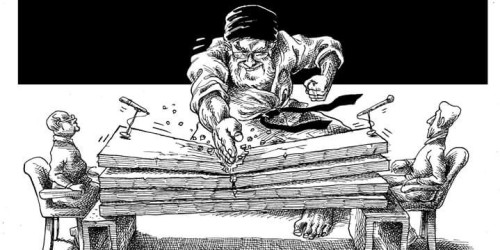PHOTO: Khamenei: Negotiations with the US Are Forbidden! (Mana Neyestani)
In a firm message on Wednesday, Iran’s Supreme Leader shut down the Rouhani Government’s foreign policy of “engagement” of the US and regional states such as Saudi Arabia.
Addressing naval commanders, their staff, and their families, Ayatollah Khamenei implicitly criticized President Rouhani, Foreign Minister Mohammad Javad Zarif, and allies like former President Hashemi Rafsanjani as misguided and even dangerous:
The current challenge of the country is because of some inconsiderate or naïve people who do not realize such realities.
They are few and a minority in front of huge number of the Revolutionary, insightful, and aware people in the country. But they are active, they write, speak, repeat and are supported by enemies.
See Iran Analysis: Supreme Leader Slaps Down Rouhani’s “Naive” Foreign Policy & Talks with US
Since the July 14 nuclear deal, the Supreme Leader has drawn a firm line against cooperation with the US, portraying Washington as a determined foe trying to use the agreement to subvert the Islamic Republic.
He returned to the theme on Wednesday, “There is a reason we are against talks with US: Iran’s negotiation with US means infiltration. They want to pave the way for imposition.”
Greeting the Supreme Leader, the Revolutionary Guards’ naval commander, Admiral Ali Fadavi, framed the message: “The soldiers are ready for your order to give a historical lesson to the Great Satan and its insidious, child-killing lackeys in the region.”
Khamenei’s top aide, Ali Akbar Velayati, reinforced the declaration:
We have no need for relations with America as the Iranian nation is independent, great and powerful….
The Americans have frozen Iranians’ assets, helped Saddam Hussein during the imposed war [of the 1980s] and had a hand in every single plot against the Islamic Republic, so we do not need their help.
University of Tehran academic Seyed Mohammad Marandi, a frequent spokesman for the Supreme Leader’s line, speaks with Press TV:
Curbing the Government’s Regional Strategy
Ayatollah Khamenei’s command went far beyond the Americans, however, to set down a line on regional crises from Syria to Yemen to Iraq.
In June 2014, the Supreme Leader vetoed President Rouhani’s recommendation of discussions with the US to meet the challenge of an Islamic State which had taken large parts of Iraq. Since then, Rouhani and Zarif have held out the possibility of better relations with Saudi Arabia — the Saudis are a leading backer of the Syrian opposition and rebels, and Riyadh began bombing of Yemen in March to check the Ansar Allah (Houthi) movement which had taken control of the capital — but they have been checked by hard-line criticism.
The possibility of engagement further receded in the last two weeks, following the deadly stampede at the Hajj ritual in Mina near Mecca which killed 464 Iranians among the thousands of casualties The Supreme Leader has demanded an apology from the Saudis, and the Revolutionary Guards have warned of a “harsh response”.
With his speech on Wednesday, Ayatollah Khamenei underlined that Iran’s strategy for the Middle East cannot be based on cooperation with the Saudis.
The effect of the message was even greater because it came as a direct response to an interview with Foreign Minister Zarif in The New Yorker magazine. Zarif, who has been in discussions at the UN in New York for the past two weeks, said discussions were possible with the US:
If we stay on the same line and continue good-faith implementation of JCPOA [the nuclear deal], then we have a possibility to create some confidence that would enable us to deal with other issues.
I’ll take one step at a time. But I’ll take firm steps. And you saw that that works.
On Wednesday, Zarif also tried to turn the hostile rhetoric over the Mecca stampede: he said that, while cooperation with Saudi officials over the aftermath of the tragedy had been “very inappropriate and incomplete…it has gotten much better in recent days”.
Khamenei linked his rejection to the domestic battle over the Government’s attempt to open up political and cultural space. The Supreme Leader warned, “Among the schemes [orchestrated] by the enemy’s political and cultural armies are to undermine religious and political beliefs and seek to draw in active and influential youth at different levels.”
The Government could celebrate one victory on Wednesday, as the nuclear agreement with the 5+1 Powers (US, Britain, France, Germany, China, and Russia) moved closed to acceptance by the Parliament. Despite reservations about the deal, a Parliamentary Commission has recommended conditional acceptance, and a final endorsement is expected from MPs on Sunday.
Despite his opposition to engagement with the US, Ayatollah Khamenei supported the nuclear talks from the Rouhani Government’s resumption of the process in autumn 2013 to the July 14 agreement. In recent weeks, however, he had maintained a balance between the Government and hard-line opponents demanding a formal vote in Parliament.

